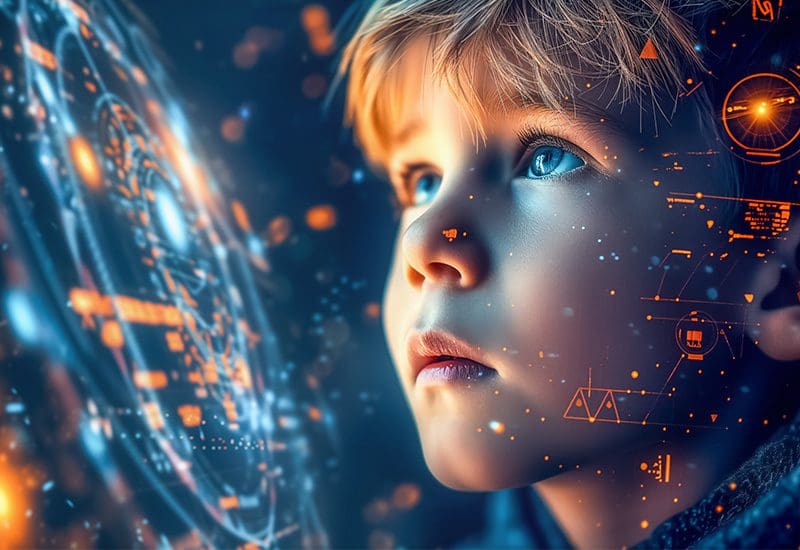Artificial Intelligence in Education and Personalized Learning
An Introduction to AI in Education and its Impact on Crafting Individualized Learning Experiences
Kelsey Young, Copywriter and Media Specialist
5 Min Read

In the dynamic landscape of education, Artificial Intelligence in education heralds a transformative era of personalized learning and teaching efficiency. AI, by mimicking human intelligence, revolutionizes traditional educational paradigms, shifting the focus from a one-size-fits-all approach to tailored experiences that cater to the individual needs and learning pace of each student.
As educators embrace AI-driven technologies, the classroom becomes a hub of interactive learning, where AI algorithms dynamically adjust educational content in real-time, fostering engagement and enhancing retention. But the question arises: How can educators harness the full potential of AI in the classroom?
This is where leveraging the expertise of an IT Service Provider becomes invaluable. Collaborating with such providers facilitates seamless integration of AI tools into the educational ecosystem, ensuring that educators have access to cutting-edge technologies that optimize teaching strategies and enhance student learning outcomes. By partnering with an IT Service Provider, educational institutions can embark on a journey towards a brighter educational future, where AI empowers both educators and students alike to reach new heights of academic excellence.
The Revolutionary Impact of Artificial Intelligence on Education and Personalized Learning
The journey of educational technology from chalkboards to digital tablets shows a clear trajectory towards increasingly personalized and interactive learning experiences. AI represents the next significant leap in this evolution, promising to deliver education that adapts to the learner, rather than the other way around.
Artificial Intelligence (AI) is reshaping the landscape of education, offering unprecedented opportunities for personalized learning and teaching efficiency. This transformative technology is not just changing the way educators teach but also how students learn, making education more accessible, engaging, and tailored to individual needs.
AI operates by mimicking human intelligence to perform tasks such as learning from data, recognizing patterns, making decisions, and solving problems. Within the educational sphere, AI is harnessed through adaptive learning technologies that dynamically adjust educational content based on a learner’s real-time performance. This adaptability ensures that students are provided with a learning experience uniquely suited to their level of understanding and learning pace.
What is AI-driven learning in education? AI-driven learning in education refers to the utilization of Artificial Intelligence technologies to tailor educational content and teaching methodologies based on individual student’s learning styles, preferences, and performance data, thereby optimizing the learning experience and enhancing educational outcomes.
Behind AI-driven Learning
AI operates by mimicking human intelligence to perform tasks such as learning from data, recognizing patterns, making decisions, and solving problems. Within the educational sphere, AI is harnessed through adaptive learning technologies that dynamically adjust educational content based on a learner’s real-time performance. This adaptability ensures that students are provided with a learning experience uniquely suited to their level of understanding and learning pace.
One illustrative example of AI-driven learning is the platform DreamBox, which offers math lessons tailored to the student’s learning speed and understanding, thereby improving engagement and retention. Such platforms are backed by data analytics that provide educators with insights into student learning patterns, thereby enabling the continuous enhancement of teaching strategies.
Trends in AI and Personalized Learning
As AI continues to evolve, it is set to bring about more innovations in education, shaping the future of how we teach and learn. Here are some trends to watch:
Advancements in Natural Language Processing
Natural language processing (NLP) technologies are expected to become more sophisticated, enabling AI systems to understand and generate human language more effectively. This will make intelligent tutoring systems even more interactive and capable of providing comprehensive feedback and support to students.
Increased Integration of Augmented and Virtual Reality
Augmented reality (AR) and virtual reality (VR) are set to become integral components of AI-driven education, offering immersive experiences that can simulate complex real-world scenarios. These technologies can revolutionize fields like medical education, engineering, and history, providing students with experiential learning opportunities that were previously impossible.
Ethical AI and Bias Mitigation
As AI’s role in education grows, so does the importance of developing ethical AI systems that are free from biases. There will be an increased focus on creating AI that promotes fairness and inclusivity, ensuring that all students have equal access to personalized learning opportunities.
Key Applications of AI in Education
The integration of AI into education has brought forth groundbreaking applications that are reshaping the learning experience, making it more tailored and efficient. Here are some of the key applications:
Personalized Learning Experiences
One of the most significant contributions of AI to education is personalized learning experiences. AI algorithms can sift through vast amounts of data to tailor educational content to the individual learning styles, needs, and pace of students.
Intelligent Tutoring Systems
AI has paved the way for intelligent tutoring systems, which can provide personalized tutoring to students. Systems such as Squirrel AI have been successful in offering one-on-one support in subjects like mathematics, adapting to the student’s learning pace and style to optimize understanding and retention.
Automating Administrative Tasks
Beyond directly influencing learning and teaching, AI has streamlined administrative tasks for educational institutions. From processing admissions to scheduling classes and grading assignments, AI applications like GradeScope have automated these processes, enhanced efficiency and allowing educators to focus more on teaching than on administrative responsibilities.
AI-powered Tools for Teachers
Beyond directly influencing student learning, AI significantly empowers teachers. It can automate burdensome tasks like grading and generating personalized feedback, freeing teachers to devote more time to interactive teaching. AI also aids in creating a more dynamic curriculum that adapts to students’ evolving needs.
Adaptive Learning Environments: The Future of Education
The development of adaptive learning environments represents AI’s most profound impact on education. These environments leverage AI to craft personalized educational pathways, adjusting in real-time to each student’s progression, strengths, and learning challenges. This ensures that all learners can reach their potential at their own pace.
The Minerva Project, a university program, exemplifies the successful implementation of adaptive learning by using AI to adjust teaching methods and content based on real-time student performance data. This approach has shown promising results in enhancing student engagement and outcomes.
However, the integration of AI in education raises significant challenges, including data privacy concerns, the potential widening of the digital divide, and the importance of maintaining a human element in education. Addressing these challenges requires a collaborative effort among educators, policymakers, and technologists.
Conclusion: Embracing AI for a Brighter Educational Future
The integration of Artificial Intelligence into the educational sector signifies the dawn of a new era of personalized learning. This revolution has the potential not only to enhance educational outcomes but also to democratize learning by making personalized, high-quality education accessible to all students, regardless of their socioeconomic background.
Interested in AI and not sure where to start? GDC can help. Contact us and one of our dedicated account managers will reach out. Beginning with a consultation, we seek to understand your school’s current technological infrastructure, educational goals, hardware needs, and specific needs for AI implementation. From there, we can design a roadmap that aligns with your school’s educational objectives, budget, and timeline.




